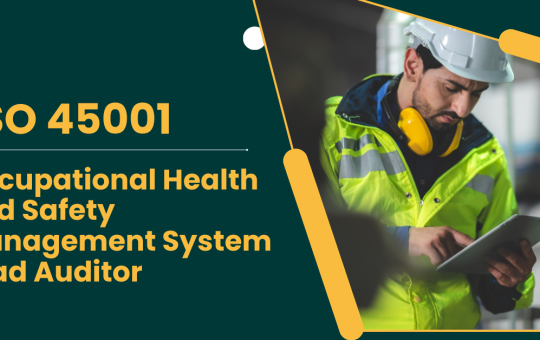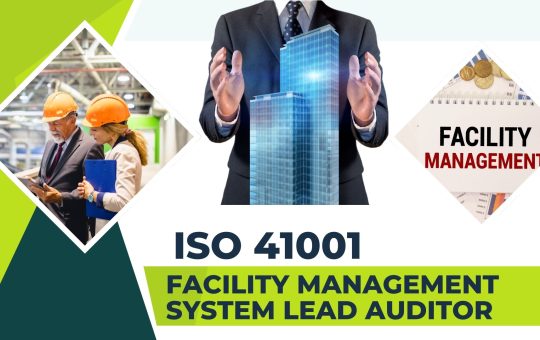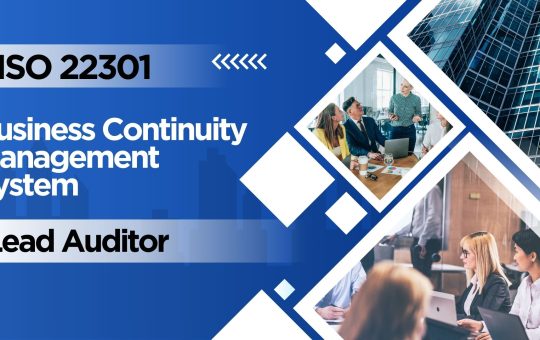
ISO 50001: Energy Management System Lead Auditor
- Global Recognition: Acquire a globally respected certification in energy management auditing.
- Cost Efficiency: Help organizations optimize energy usage and reduce costs.
- Sustainability Leadership: Contribute to environmental sustainability through energy conservation.
- Advanced Skills: Master auditing techniques for energy systems.
- Career Advancement: Open doors to leadership roles in energy management and consultancy.
- Regulatory Compliance: Ensure organizations meet legal and industry-specific energy requirements
- Introduction to ISO 50001
- Overview of energy management systems.
- Benefits and objectives of ISO 50001 certification.
- Energy Performance and Data Analysis
- Identifying energy baselines and performance indicators.
- Monitoring, measuring, and analyzing energy consumption.
- Audit Principles and Planning
- Understanding audit principles and processes.
- Developing effective audit plans and schedules.
- Energy Efficiency Strategies
- Techniques to identify and mitigate energy inefficiencies.
- Promoting energy-saving initiatives within organizations.
- Audit Execution and Evidence Collection
- Conducting on-site inspections and interviews.
- Gathering and verifying audit evidence.
- Non-Conformance and Corrective Actions
- Documenting findings and recommending improvements.
- Strategies for implementing corrective actions.
- Reporting and Stakeholder Communication
- Creating professional audit reports.
- Presenting findings to stakeholders and leadership teams.
- Continuous Improvement and Sustainability
- Leveraging audit results to enhance energy performance.
- Supporting long-term energy efficiency goals.
- Lead Energy Auditor: Conduct audits to optimize energy management systems.
- Energy Manager: Develop strategies to improve energy efficiency.
- Sustainability Consultant: Advise organizations on energy conservation and sustainability.
- Regulatory Compliance Specialist: Ensure adherence to energy-related regulations.
- Energy Efficiency Analyst: Analyze data to recommend energy-saving solutions.
- Certified Experts: Learn from experienced ISO 50001 lead auditors.
- Real-World Application: Hands-on case studies and practical exercises.
- International Standards: Training aligned with global energy management practices.
- Flexible Scheduling: Online and in-person training options.
- Post-Certification Support: Continued access to resources and expert advice.
- Proven Success Rate: High pass rates and positive participant feedback.
Study Units
- Introduction to ISO 50001
- Overview of energy management systems.
- Benefits and objectives of ISO 50001 certification.
- Energy Performance and Data Analysis
- Identifying energy baselines and performance indicators.
- Monitoring, measuring, and analyzing energy consumption.
- Audit Principles and Planning
- Understanding audit principles and processes.
- Developing effective audit plans and schedules.
- Energy Efficiency Strategies
- Techniques to identify and mitigate energy inefficiencies.
- Promoting energy-saving initiatives within organizations.
- Audit Execution and Evidence Collection
- Conducting on-site inspections and interviews.
- Gathering and verifying audit evidence.
- Non-Conformance and Corrective Actions
- Documenting findings and recommending improvements.
- Strategies for implementing corrective actions.
- Reporting and Stakeholder Communication
- Creating professional audit reports.
- Presenting findings to stakeholders and leadership teams.
- Continuous Improvement and Sustainability
- Leveraging audit results to enhance energy performance.
- Supporting long-term energy efficiency goals.
Competency Targets
Upon successful completion of this course, participants will be able to demonstrate the following professional competencies:
Audit Leadership:
Lead ISO 50001 energy management system audits effectively, ensuring conformance with international standards and best practices.Analytical Evaluation:
Assess organizational energy performance data to identify inefficiencies, set performance indicators, and recommend measurable improvements.Strategic Planning:
Develop and implement audit programs, checklists, and schedules aligned with ISO 50001 requirements and organizational objectives.Evidence-Based Decision-Making:
Gather, verify, and evaluate objective audit evidence to determine conformity, non-conformity, and opportunities for continual improvement.Communication and Reporting:
Present audit findings clearly and professionally to management, ensuring constructive feedback and actionable outcomes.Energy Efficiency Optimization:
Apply technical and managerial approaches to enhance energy efficiency and support sustainable operational practices.Corrective Action Facilitation:
Advise on root-cause analysis, corrective action plans, and follow-up mechanisms to maintain continual compliance and improvement.Integrated Systems Understanding:
Coordinate ISO 50001 audits in alignment with other management systems (e.g., ISO 9001, ISO 14001, ISO 45001) for holistic performance management.
Who Is This Course Designed For?
The ISO 50001: Energy Management System (EnMS) Lead Auditor course is designed for professionals who are responsible for managing, auditing, or improving energy performance in their organizations or within client companies. It is ideal for:
Energy Managers and Coordinators – seeking to enhance their knowledge of ISO 50001 and lead internal or external audits.
HSE and Sustainability Professionals – aiming to integrate energy management with existing environmental or occupational systems.
Quality, Environment, and Compliance Officers – looking to expand their auditing expertise into energy management systems.
Consultants and Auditors – who wish to offer ISO 50001 implementation and audit services.
Facilities and Operations Managers – involved in energy-intensive industries or infrastructure management.
Engineers and Technical Experts – responsible for optimizing energy efficiency and monitoring energy use.
Professionals Pursuing Career Growth – individuals aiming for senior roles in energy auditing, sustainability consulting, or compliance leadership.
Our assessment process is designed to ensure every learner achieves the required level of knowledge, skills, and understanding outlined in each course unit.
Purpose of Assessment
Assessment helps measure how well a learner has met the learning outcomes. It ensures consistency, quality, and fairness across all learners.
What Learners Need to Do
Learners must provide clear evidence that shows they have met all the learning outcomes and assessment criteria for each unit. This evidence can take different forms depending on the course and type of learning.
Types of Acceptable Evidence
Assignments, reports, or projects
Worksheets or written tasks
Portfolios of practical work
Answers to oral or written questions
Test or exam papers
Understanding the Structure
Learning outcomes explain what learners should know, understand, or be able to do.
Assessment criteria set the standard learners must meet to achieve each learning outcome.
Assessment Guidelines
All assessment must be authentic, current, and relevant to the unit.
Evidence must match each assessment criterion clearly.
Plagiarism or copied work is not accepted.
All learners must complete assessments within the given timelines.
Where applicable, assessments may be reviewed or verified by internal or external quality assurers.
Full learning outcomes and assessment criteria for each qualification are available from page 8 of the course handbook.
Top Courses
Related Courses
Let's Get in touch
Deleting Course Review
Course Access
This course is password protected. To access it please enter your password below:



